The Donnan Potential, Revealed at Last
Lawrence Berkeley National LaboratoryThe Donnan electric potential arises from an imbalance of charges at the interface of a charged membrane and a liquid, and for more than a century it has stubbornly eluded direct measurement. Many researchers have even written off such a measurement as impossible. But that era, at last, has ended. With a tool that’s conventionally used to probe the chemical composition of materials, scientists at the Department of Energy's Lawrence Berkeley National Laboratory (Berkeley Lab) recently led the first direct measurement of the Donnan potential.




















